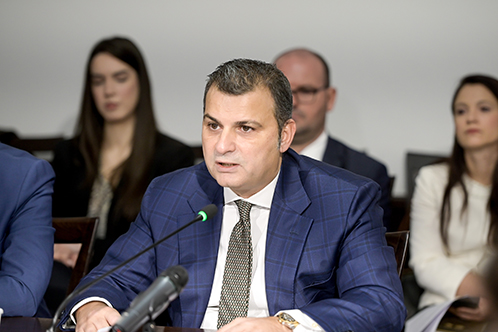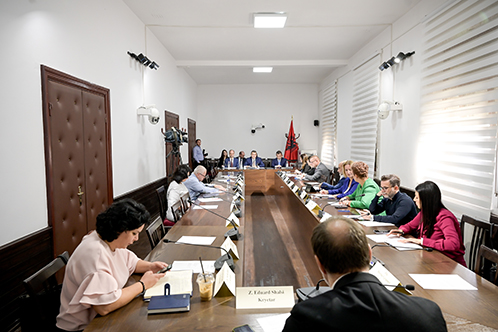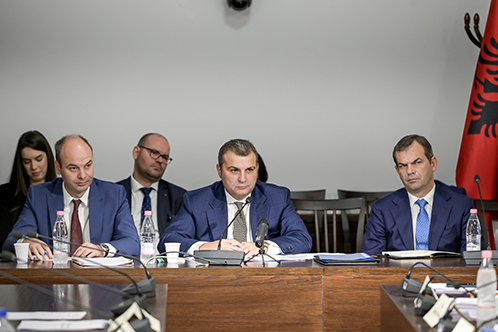BANK OF ALBANIA
Governor Sejko presents BoA’s opinion on the Draft Budget 2023 to the Parliamentary Committee on Economy and Finance
Publication date: 04.11.2022
Honourable Chair,
Honourable Members of the Committee,
First, I would like to thank you for the invitation to present to this Committee the opinion of the Bank of Albania on the 2023 Draft Budget.
The Bank of Albania has continuously valued the open discussion on budget approval, as it includes both institutional stakeholders and other relevant actors. This process serves as an important instrument in drafting the most optimal budget and getting the broadcast consensus on its regard. In this context, as an institution mandated to safeguard the domestic monetary and financial stability, and in its role as the financial advisor of the government, I will put forth the viewpoint of the Bank of Albania on the main issues regarding the 2023 draft-budget.
In compliance with the legal mandate and within the scope of our competence and expertise, the following opinion will focus on three main issues:
- First, I will present the Bank of Albania's opinion on fiscal policy stance which affects the main draft-budget indicators related to budget deficit, revenues and public spending.
- Second, I will address the structural aspects of the budget and taxation policy, which affect the efficiency of fiscal policy and the flexibility of public finances to withstand shocks.
- Third, I will provide some suggestions of the Bank of Albania, which aim to enhance the long-term sustainability of public finances.
Before going into further details, allow me to emphasize that the 2023 Draft Budget and its accompanying report mark a step forward toward increasing transparency, as well as strengthening the analytical framework in order to identify the structural weaknesses of the Albanian economy and assess the risk related to public finances. Against this backdrop, we encourage to continue the work conducted on this regard, with a view to integrate to the best of our abilities the analysis on the available financial resources and the main developmental goals, so that we can enable the most optimal allocation of public funds to the economy.
I will lay out the assessment of the fiscal policy stance presented in the draft budget.

1. The macroeconomic context and fiscal policy
The 2023 draft budget is compiled while taking into account some major challenges, which have affected both the global and Albanian economy.
As we are well aware, the Russian armed conflict against Ukraine and the imposed sanctions, triggered an unprecedented supply-side shock. The upsurge in the prices of food, oil, energy and commodities in global markets, were reflected by a progressive rise of inflation in Albania, as it reached at 8.1% in September. Our analysis suggests that the initial external shock has started to spillover on the production cost structure and future expectations of market operators, risking to become a persistent inflationary period.
The Bank of Albania deems that the main risk to the stable and long-term growth, in Albania, is the expansion and strength of inflationary pressures. A high and persistent level of inflation threatens the domestic economic and financial stability, which remains a necessary precondition to the economic and social development. In the same vein, this type of inflation reduces long-term investments, disproportionally hits the lowest income earners, increases uncertainty among households and enterprises, and damages social cohesion.
As a result, undertaking measures that guarantee price stability in the shortest time and at the most reasonable cost possible, should be the current priority of economic policies. Consequently, the Bank of Albania has started the normalisation of the monetary policy stance, by gradually raising the policy rate and by expressing our willingness to continue this process until the monetary and financial conditions become adequate to maintain our inflation target.
However, global theory and practice show that economic policies have greater efficiency when they are consistent and coherent. Under these circumstances, the Bank of Albania commends the fiscal consolidation engagement, which is also the main message of the 2023 draft budget. Overall, fiscal consolidation looks like a reduced budget deficit - from 3.3% of GDP expected in 2022, to 2.6% of GDP in 2023; and an improved primary balance - from a deficit of 1.3% of GDP expected in 2022, to a surplus of 0.2% of GDP in 2023.

The Bank of Albania deems that this consolidation will impact positively the domestic economy and its financial markets.
- First, it signals the willingness of the Albanian government to safeguard the long-term soundness of public finances, by increasing their credibility for domestic and foreign investors and controlling the long-term costs of public debt financing.
- Second, fiscal consolidation reduces the need of the public sector to borrow in the domestic financial market, by easing the private sector's financing costs.
- Third, it reduces the need for a rapid and strong normalisation of the monetary policy stance, by cushioning the burden of adjusting to the new reality, between the public and private sector.
To this end, given the challenges ahead of us, the Bank of Albania deems that the fiscal consolidation and the normalisation of the monetary policy stance are the best possible economic policy mix. This combination enables inflation to return to target within the first half of 2024, and it doesn't hinder economic growth premises.
Our projections suggest that economic growth in Albania will remain in the positive territory in the upcoming years as well. Although the external environment remains challenging and economic growth in Albania is expected to slow down in the short run, in the medium and long term, the reduction of inflation, fewer uncertainties and the stabilisation of financial conditions, will drive to an accelerated growth pace. The growth of the Albanian economy is expected to be underpinned by: the domestic demand for goods and services; sound balance sheets of the private sector; maintaining the positive credit growth; as well as the continuation of the upward trend of tourism revenues.
Based on the above, the Bank of Albania judges that the macroeconomic framework forecasted in the draft budget is real and consistent, regarding both the current domestic trends of development and the expected monetary and fiscal policy stance.
However, given the importance of the fiscal consolidation and the additional uncertainties predicted, the Bank of Albania deems that this process should be monitored on ongoing basis and should be protected from risk scenarios.
In more details, the Bank of Albania notes that the fiscal consolidation in 2023 is based on:
- the increase in the share of tax revenues to GDP;
- the moderate increase of the share of staff expenses, for special funds and local budget, to GDP;
- the allocation of additional funds to cover interest expenses;
- maintaining the share of public investments to GDP unchanged; and
- reducing subsidies to the energy sector.
On the revenue side, the Draft Budget for 2023 predicts budget revenues at the level of ALL 632 billion, or 29% of GDP, up by 9% compared to the level expected for 2022. This prediction takes into account the expected growth of economic activity in Albania, the new fiscal measures, and the benefits expected from the improved efficiency of the taxation and customs administration. In more concrete terms, the growth in the nominal volume of the economic activity is expected to bring around ALL 22 billion additional budget revenues, the new fiscal measures are expected to bring around ALL 15 billion, whereas the improved efficiency around ALL 8 billion. The Bank of Albania judges that the central projection on total revenues is acceptable, although remaining on the upside of our expectations.
In the expenses side, the 2023 draft budget forecasts public expenses at the level of ALL 687 billion, or 31.6% of GDP. This prediction factors in the increase of wages and pensions, the rising costs of debt servicing, maintaining a high rate of capital expenses, and the significant reduction of subsidies to the energy sector, underpinned seemingly by the expected improvement of domestic production and the reduction of prices in international markets.
In principle, the Bank of Albania supports a consolidation process led by the growth in budget revenues. This action, which is based on the continuous elimination of informality and tax evasion, boosts competition and efficiency in the economy. It also preserves the space necessary for public spending, particularly for emerging countries, which are in the process of converging to the EU standards as well, such as Albania. Simultaneously, we support a controlled growth of current expenses in the short term, to address - in a targeted manner - the shock of inflation to the people most in needs.
However, the Bank of Albania estimates that the balance of risk in the Budget is on the side of deficit expansion. These risks stem from the downside risks on economic growth and the realisation of forecasted revenues, as well as the uncertainties of predictions related to the degree of improvement of taxation efficiency and the balances of the energy sector.
To address these risks, the Bank of Albania suggests:
- to provide a higher level of contingency funds in the budget, in order to increase operational efficiency and implement the spending plan, as a priority;
- to continuously monitor the performance of the financial balance of the Albanian energy sector, and to intervene in a timely manner in order to avoid potential costs springing from rising prices in foreign markets or production issues in the domestic market;
- to regularly monitor the performance of revenues and the public investments plan, in order to take the measures that keep the budget deficit within the planned parameters.

2. Strengthening the effectiveness and sustainability of public finances
The efficiency and flexibility of the fiscal policy are the two most desirable features of public finances.
The efficiency of fiscal policy means to establish a direct balance between its redistribution function - the fiscal instruments which mitigate social inequality and protect the vulnerable members of society - and its function as an instigator of economic development. The flexibility of public finances implies their ability to withstand unprecedented shocks, without engendering a steep increase in taxes or massive spending cuts.
In this light, both the tax framework and the spending structure of the budget and their rate of realisation throughout the year, are of primary importance.
As regards the tax framework, the Bank of Albania has continuously emphasized that it needs to increase its sustainability and predictability. In parallel, designing a simple and standardized tax framework, as well as eliminating informality, would benefit the overall efficiency of public finances.
In this regard, we support the government's effort to enhance formality, assessing that the long-term benefits of this process surpass the short-term costs. At the same time, we encourage to accelerate the steps toward adopting the medium-term strategy of public revenues. This strategy should serve as an anchor and guide to our tax system, by re-assessing the priorities and instruments of this system and by enhancing the predictability in the medium and long run.
More specifically, the Bank of Albania demands the revision of an amendment proposed in the Draft Budget “On Revenue taxation,” which aims to revoke the amendment enacted in the tax legislation regarding the accounting treatment for loan losses and their inclusion in the list of expense deductions. These improvements were an essential element in the National Strategy for the Reduction of Non-performing Loans, which was approved by the Albanian government and the Bank of Albania in 2015. This strategy was crucial for significantly decreasing the non-performing loans in the banking sector and for maintaining a low ratio of these loans in the future.
As regards the spending structure, the Bank of Albania deems that maintaining a direct relation between current and capital expenses is crucial to the efficiency and flexibility of public finances. In more concrete terms, the need for capital investments is apparent for emerging economies like Albania, in order to improve the physical capital stock that underpins the development of the country and the process of convergence with the EU standards. Moreover, maintaining a positive current balance enhances the flexibility needed to withstand shocks, so long as pubic investments have a higher discretionary degree in the realisation compared with current expenses.
To this end, we deem that one of the positive aspects of the Albanian public finances is the high level of investments and their positive current balance structure. More specifically, capital expenses for the past five years have remained at an average of 5.5% of GDP, accounting for 18% of overall public expenses, on average. Also, these expenses were on average 50% higher than budget deficit, showing a relatively high level of fiscal responsibility in this regard.
In this context, the Bank of Albania considers it necessary to emphasise the importance of maintaining the current space for public investments in the Budget's structure. This requires attentiveness to current expenses in both the medium and long term, by increasing them in line with the structural improvements on the basis of public revenues and the war against informality.
While remaining on the issue of efficiency, the Bank of Albania continues to recall that, throughout the year, expenses should be better distributed in time and their concentration should diminish in the fourth quarter. This phenomenon - repeated and dictated to a larger extent by the uneven realisation of investments- creates unnecessary fluctuations in the domestic financial market and reduces the efficiency of public spending.
Dear members of the Committee, allow me to present the third and final point.
3. Enhancing the long-term sustainability of public finances
If we were to assume a more scrutinized standpoint, we would realise that the long-term sustainability of public finances is the main feature for the assessment of fiscal policy. This sustainability serves as a final guarantee to the economic and financial stability of Albania. It drives the economic risk premia and affects the financing costs of the private and public sector.
In this context, the Bank of Albania assesses that the forecasted reduction of public debt in the 2023 draft budget, from 68.8% of GDP expected in 2022, to 65.7% of GDP in 2023, is positive. We assess that adopting an additional provision in the Organic Budget Law is also positive. This provision requires that a positive primary balance is maintained in every fiscal year, as a guarantee for the sustainable reduction of public debt.
In the same vein, in order to maintain and consolidate the sustainability of public finances, the Bank of Albania finds it appropriate to reiterate the following suggestions and recommendations.
On deficits in health and social insurance schemes
The draft budget 2023 projects that expenses for social and health insurance consists of 1/3 of budget expenses. Also, the deficit of these schemes are expected to be around 4.2% of GDP, around 60% higher than the overall budget deficit.
The social and health insurance schemes will continue to be a heavy burden to the state budget. In this context, by considering also the unfavourable geographical trends, the Bank of Albania suggests the periodic review lending activity pension scheme, health insurance scheme and other social insurance schemes, with the aim to maintain these schemes on a stable trajectory and affordable for the state budget.
On the management of Public - Private Partnership programmes
The Public - Private Partnership programmes (PPP) present potential risks to public finances. In this context, the Bank of Albania welcomes the heightened attentiveness in the draft budget toward potential PPP risks. We also welcome the strengthening of the role of the Ministry of Finance and Economy in conducting a preliminary analysis of these projects and continuously monitoring them.
However, in line with our previous position, the Bank of Albania suggests:
- Including an overall upper limit on the PPPs total value. This regulation would supplement the control of the level of potential risk that PPPs would have on the soundness of public finances.
- The integration of contracting and selecting of PPPs process with strategic program of investments, as identified in the long-term development programs of the country.
- Finally, continuously improving the professional capacities of units that manage the assessment, contraction and monitoring of these projects, particularly regarding legal and financial obligations that they pose to the budget.
***
Honourable Chair,
Dear Ladies and Gentlemen,
Thank you for your attention!

 Twitter
Twitter
 Youtube
Youtube
 Facebook
Facebook
 Flickr
Flickr
 RSS
RSS
 Subscribe
Subscribe
 Feedback
Feedback